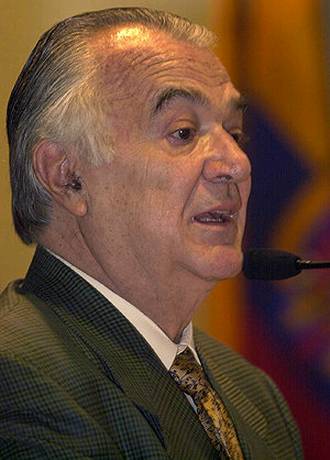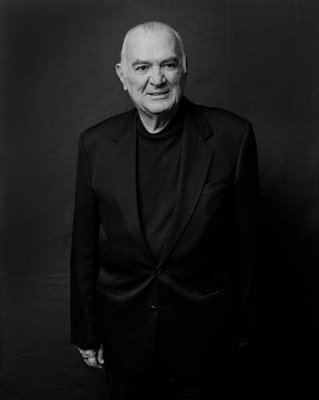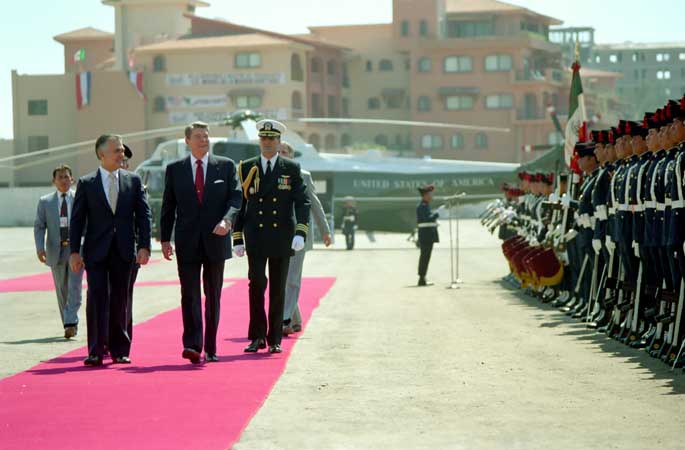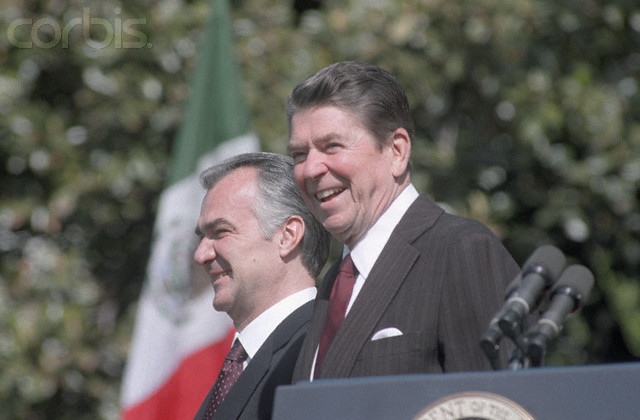<Back to Index>
- Mathematician Peter Ludwig Mejdell Sylow, 1832
- Composer Johann Christian Innocenz Bonaventura Cannabich, 1731
- President of Mexico Miguel de la Madrid Hurtado, 1934
PAGE SPONSOR


Miguel de la Madrid Hurtado (August 12, 1934 – April 1, 2012)
was a Mexican politician affiliated with the Institutional Revolutionary
Party (PRI) who served as the 52nd President of Mexico from 1982 to
1988.
Miguel de la Madrid was born in La Ciudad de Colima, Colima, Mexico. He was the son of the late Miguel de la Madrid Castro a notable lawyer, who died when Miguel was only two, and his mother Alicia Hurtado. His grandfather was Enrique O. de la Madrid who was governor of the state of Colima.
Miguel de la Madrid graduated with a bachelor's degree in law from the National Autonomous University of Mexico (UNAM) and received a master's degree in Public Administration from the John F. Kennedy School of Government at Harvard University, in the United States.
He worked for Mexico's central bank and lectured in law at UNAM before securing a position at the Secretariat of Finance in 1965. Between 1970 and 1972 he was employed by Petróleos Mexicanos, Mexico's state owned petroleum company, after which he held several other bureaucratic posts in the government of Luis Echeverría. In 1976 he was chosen to serve in José López Portillo's cabinet as secretary of budget and planning.
He was president after López Portillo. He won the elections that took place on July 4, 1982, and took office the following December.
He was a member of Collegium International, an organization of leaders with political, scientific, and ethical expertise whose goal is to provide new approaches in overcoming the obstacles in the way of a peaceful, socially just and economically sustainable world.
Unlike previous Mexican leaders, he was a market oriented
President, and his time in power was one of the most difficult periods
of the country because of his predecessors' policies, as well as the decreasing demand for oil.
Inflation increased on an average of 100% a year (culminating to an
unprecedented level of 159% in 1987). Unemployment rates soared to as
much as 25% during the mid 1980s, income declined and economic growth
was erratic. This became a stark reminder of the gross mismanagement and
inept policies of the administrations in the 1970s, particularly the
financing of development with excessive borrowing from abroad.
During his presidency, de la Madrid introduced neoliberal economic reforms that encouraged foreign investment, widespread privatization of outdated state run industries, and reduction of tariffs, a process that continued under his successors, and which immediately caught the attention of the International Monetary Fund (IMF) and other international observers. In 1986, Mexico entered the General Agreement on Tariffs and Trade (GATT) treaty, following its efforts at reforming and decentralising its economy. All told, the number of state owned industries went down from approximately 1,155 in 1982 to 412 in 1988.
As an immediate reaction to the economic crisis, de la Madrid first presented the Immediate Economic Reorganization Program (Programa Inmediato de Reordenación Económica) and a couple of months later the National Development Plan (Plan Nacional de Desarrollo). The measures proposed were inter alia: a reduction of public spending, fiscal reforms, re-structuring the bureaucracy, and employment protection.
His administration's mishandling of the infamous 1985 earthquake in Mexico City damaged his popularity because of his initial refusal of international aid. It placed Mexico's delicate path to economic recovery in an even more precarious situation, as the destruction also extended to other parts of the country.
During the administration of de la Madrid an electoral reform was conducted (1986). Changes introduced with this reform were inter alia:
- The number of members of the Chamber of Deputies being elected according to proportional representation (plurnominals) was increased from 100 to 200. This allowed for a better representation of opposition parties.
- The senate is composed of 2 senators from each state, as well as 2 from the Federal District of Mexico. An election of half of its members takes place every 3 years.
- The Legislative Assembly of the Federal District of Mexico was created.
Cuauhtémoc Cárdenas and other politicians from the Institutional Revolutionary Party (PRI) announced the creation of the Democratic Current (Corriente Democrática) within the PRI. The Democratic Current demanded the establishment of clear rules for the selection of the party’s presidential candidate. When they failed, Cuauhtémoc Cárdenas and Porfirio Muñoz Ledo left the PRI and joined the National Democratic Front (Frente Democrática Nacional), a loose alliance of left wing parties.
Galloping inflation, the controversial privatization program and austerity measures imposed by his administration caused the ruling party to lose ground, leading up to the controversial elections of 1988. On Election Day 1988, a system shutdown occurred (“se cayó el sistema”). When the system was restored, Carlos Salinas was declared the winner. The expression “se cayó el sistema” (the system crashed) became a euphemism for electoral fraud.
In 1983 the Contadora Group
was launched by Colombia, Panama, Venezuela and Mexico to promote peace
in Latin America and to deal with the armed conflicts in El Salvador,
Nicaragua, and Guatemala.
After completing his term, Miguel de la Madrid, a major neo - liberal, he became director of the Fondo de Cultura Económica (FCE) in 1990. During his tenure as head of FCE implanted modernization programs in production and administrative areas, it incorporated the most advanced of the book publishing and graphic arts, and maintained the openness and plurality features in the publication policy of the company.
On September 4, 1992 inaugurated the new facilities, located in Picacho - Ajusco road number 227. Surrounded by gardens, plus offices, host cultural unity Jesus Silva Herzog, the Gonzalo Robles Library, which houses the growing publishing history of the Fund, and the Seller Alfonso Reyes.
On the international scene in 1990 of the existing facilities were remodeled subsidiaries. With this, the presence of the Economic Culture Fund acquired a larger projection in the Americas: September 7 of the same year the subsidiary in San Diego, California, was founded, in June 21, 1991 Seller Azteca opened its doors in São Paulo, Brazil, in 1994 FCE facilities were inaugurated in Venezuela, and in 1998 another subsidiary was established in Guatemala. Thus, the FCE reached a significant presence in Latin America with nine subsidiaries: Argentina, Brazil, Colombia, Chile, Spain, United States, Guatemala, Peru and Venezuela.
Regarding the national project, new libraries opened. In this period six opened in Mexico City
During his administration the FCE received several awards, among them: in 1992, FILIJ Book Award (CNCA) to children's books, in 1993 Golden Laurel Award (Department of Culture of the City of Madrid) in 1993, honorable mention Juan García Bacca (Peruvian Cultural Association) Award, and Gold Aztec Calendar (Mexican Association of Radio and Television). In 1994 and 1995 Award Book Bank of Venezuela for children's books.
As for the awards received as an individual, he received in 1997 the IUS Award by the Faculty of Law of the UNAM, and in 1998 the government of France awarded him the Academic Palms in rank of Commander for his contribution to cultural development. In 1999, Mr. De la Madrid received the medal Picasso Gold (UNESCO), for work on the diffusion of Latin American culture.
On May 12, 2009, he accused Carlos Salinas de Gortari of stealing money from the secret account and that his brother Raul had links to the drug trade. But then through a public letter recanted, claiming not to have the answers to the questions posed.
De la Madrid died on April 1, 2012, at 7:30am in a Mexican hospital
apparently following a lengthy hospitalization for complicated chronic
obstructive pulmonary disease, which led to acute renal failure and
cardiac arrest.


